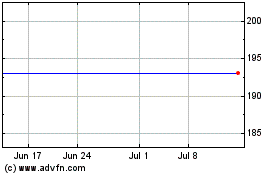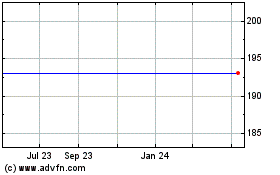Allergan Completes Licensing Deal After Pfizer Bid Collapses
April 07 2016 - 9:00AM
Dow Jones News
LONDON—Allergan PLC completed a licensing deal to develop drugs
for Alzheimer's and other neurological conditions just hours after
the collapse of its $150 billion tie-up with Pfizer Inc.,
underlining its determination to move on as a stand-alone
company.
Under the deal, Allergan will pay $125 million up front to
Heptares Therapeutics, a U.K.-based biotechnology company wholly
owned by Japan's Sosei Group Corp., plus $665 million in milestone
payments for the successful completion of clinical trials. A
further $2.5 billion in milestone payments, plus royalties, will
depend on the eventual commercial success of the drugs. Allergan
has also agreed to invest $50 million in a joint
research-and-development program to advance several drugs to
mid-stage human testing.
The move will help assure investors that the sudden withdrawal
of the Pfizer deal, as a result of new rules from the U.S. Treasury
Department designed to prevent what are known as tax-inversion
deals won't disrupt business as usual at Dublin-based Allergan.
The White House and the Treasury Department pushed back against
criticism of the new rules. They argued that they were shutting
down unfair loopholes that allow large companies to shift their tax
affairs to countries with less burdensome levies by merging with
smaller firms.
Chief Executive Brent Saunders on Wednesday said Allergan could
"act immediately if we saw the right opportunity with the right
growth profile and the right strategic logic."
Malcolm Weir, chief executive of Heptares, said Allergan's focus
was apparent in his interactions with the company. "We never got
any sense of breaking of stride with Allergan," Mr. Weir said.
"They always showed a face of very clear focus on what they were
trying to do with their business."
The deal involves three classes of drugs in early-stage
development, that aim to treat symptoms of Alzheimer's such as
cognitive problems and psychosis. The most advanced program has two
drugs in early human testing.
Heptares's drug-discovery platform centers on its ability to
precisely determine the shape of molecules that appear on the
surface of cells. Such molecules, which are commonly used as drug
targets, are difficult to analyze because they become unstable when
extracted from their natural environment. Technology such as
Heptares's helps researchers design drugs more closely tailored to
their targets, reducing the risk of side effects, which arise when
drugs bind with other molecules in the body.
Several other large pharmaceutical companies, including Pfizer,
AstraZeneca PLC and Teva Pharmaceutical Industries Ltd., have
struck licensing deals to access Heptares's technology, though the
Allergan deal is its biggest yet.
David Nicholson, head of global brands research and development
at Allergan, said Heptares's compounds had "shown promising results
in early development," including evidence they could act without
causing side effects.
Write to Denise Roland at Denise.Roland@wsj.com
(END) Dow Jones Newswires
April 07, 2016 08:45 ET (12:45 GMT)
Copyright (c) 2016 Dow Jones & Company, Inc.
Allergan (NYSE:AGN)
Historical Stock Chart
From Mar 2024 to Apr 2024

Allergan (NYSE:AGN)
Historical Stock Chart
From Apr 2023 to Apr 2024
